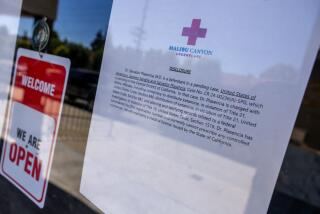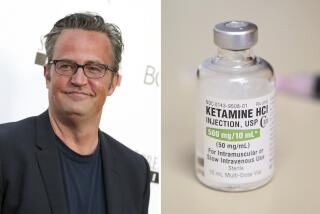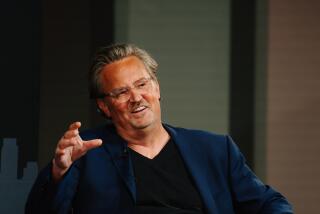Prosecutors say phone records show doctor not focused on Jackson
- Share via
There were only two people in Michael Jackson’s bedroom the morning he stopped breathing: the singer and the doctor now on trial in his death. But prosecutors suggested another source of information Monday: Dr. Conrad Murray’s cellphones.
Records presented as Murray’s involuntary manslaughter trial entered its second week showed the doctor used a pair of cellphones to talk to and text patients, his daughter, a love interest and others in the period leading up to Jackson’s overdose.
Prosecutors have said the communications are proof the doctor was not focused on Jackson while he was administering a powerful anesthetic that required constant monitoring of the singer’s vital signs. Jackson died June 25, 2009, with a lethal amount of propofol in his system.
In the hours before Murray found Jackson unresponsive in bed, the doctor placed five phone calls, received six others and sent numerous text messages and emails, the records indicate.
He spent 46 minutes of the final hour on the phone, talking to his Las Vegas office for more than half an hour. A Houston waitress whom Murray was dating is expected to testify that he abruptly ended their conversation about noon, when prosecutors contend Murray discovered his patient wasn’t breathing.
Some of the records are difficult to square with a timeline Murray laid out for police. In an interview with detectives two days after Jackson’s death, Murray said he was looking closely at his watch as he treated the pop star. He said Jackson began begging for the propofol at 10 a.m., saying he would have to cancel concert rehearsals if he couldn’t sleep. He said he finally gave in to Jackson’s requests about 10:40.
But the phone records show Murray spent eight minutes on the phone with an employee in his Las Vegas office during this period, concluding the call about 10:42.
The records also raise questions about how much time Murray was spending in Jackson’s presence. He told detectives that he left Jackson’s bedroom for two minutes to use the restroom, but the records show lengthy conversations, including a 22-minute call with his daughter, during the time Jackson was struggling to fall asleep. Murray told detectives how he had tried to set a relaxed mood in the bedroom, closing the drapes, playing soft music and urging the singer to meditate.
Prosecutors summoned to the witness stand four people who had phone contact with Murray that day, including a former patient, a woman who answered phones in his office and a Houston internist who called him that morning to discuss a shared patient. Dr. Joanne Prashad said she was struck by how familiar Murray was with the patient even though he was not in his office or able to review the patient’s chart.
“I was impressed,” Prashad said.
Jurors also heard testimony from two members of a team of doctors who tried to save Jackson’s life in the emergency room at Ronald Reagan UCLA Medical Center. Both physicians said they had repeatedly asked Murray what drugs he had given Jackson and that he acknowledged giving the singer small doses of the sedative lorazepam. He never mentioned propofol, they said.
On cross-examination, Dr. Richelle Cooper, one of the UCLA doctors, acknowledged that Jackson would have died even if she had known that he had been given propofol.
“The minute he comes in the hospital, there’s no chance?” asked defense attorney J. Michael Flanagan.
“Knowing everything I know now, that would be correct,” Cooper said.
The other physician, Dr. Thao Nguyen, said Murray told her he didn’t wear a watch and had no idea what time he had given the sedative or found Jackson lifeless. She said he seemed “devastated” and urged her to try extreme measures.
“Do not give up easily. Please try to save his life,” Nguyen recalled Murray saying.
She said she had never heard of anyone using propofol in a home setting without respiratory and heart monitors.
“Propofol does not have an antidote, so we have to prepare for the worst,” Nguyen said.
More to Read
Sign up for Essential California
The most important California stories and recommendations in your inbox every morning.
You may occasionally receive promotional content from the Los Angeles Times.












